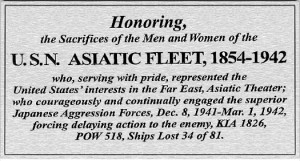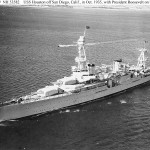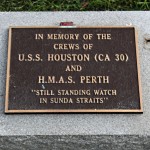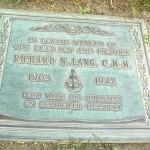Archive for June, 2012
 Few memorials exist to the sacrifices made by the U.S. Asiatic Fleet and their allies in the early months of 1942. Merged with British, Dutch, and Australian forces following Pearl Harbor; the ABDA fleet was outnumbered, outgunned, and outmanned. Totally unable to stop the Japanese push south in the Pacific, the fleet could only attempt to slow down the Japanese rush toward Australia. In that effort they were partially successful, but at a brutal cost. Almost 2,000 American lives were lost, thousands more wounded, and hundreds taken prisoner. Few of the prisoners would survive the war. British, Dutch and Australian losses were every bit as significant and tragic.
Few memorials exist to the sacrifices made by the U.S. Asiatic Fleet and their allies in the early months of 1942. Merged with British, Dutch, and Australian forces following Pearl Harbor; the ABDA fleet was outnumbered, outgunned, and outmanned. Totally unable to stop the Japanese push south in the Pacific, the fleet could only attempt to slow down the Japanese rush toward Australia. In that effort they were partially successful, but at a brutal cost. Almost 2,000 American lives were lost, thousands more wounded, and hundreds taken prisoner. Few of the prisoners would survive the war. British, Dutch and Australian losses were every bit as significant and tragic.
In a period of just five weeks, the combined fleet engaged the Japanese in five major battles. The first U.S. surface action of WWII was the Battle of Balikpapan on January 24, 1942. Four U.S. “four stacker” destroyers attacked a Japanese invasion fleet of over twenty ships. On February 4, 1942 the Battle of the Flores Sea was fought. The U.S.S. Marblehead (light cruiser) and the U.S.S Houston (heavy cruiser) were severely damaged. On February 19 and 20 the Battle of Badung Strait was fought. The Dutch destroyer Piet Hein was lost. On February 27 the Battle of Java Sea took place. The Dutch lost two cruisers and a destroyer and the British lost two destroyers. On February 28 came the Battle of Sunda Straight. The heavy cruiser U.S.S. Houston and the Australian light cruiser H.M.A.S. Perth fought bravely, but were overwhelmed by the superior Japanese numbers and were lost. The British cruiser Exeter was lost a few hours later. A brilliant history of this battle and the fate of the U.S.S. Houston crew can be found in James D. Hornfischer’s book Ship of Ghosts.
By the end of February 1942 all remaining allied ships were ordered to flee to Australia – the U.S. Navy Asiatic Fleet was no more.
Two other books offer brilliant accounts of the Asiatic Fleet. The best pure history is The Fleet the Gods Forgot by W.G. Winslow. The novel South to Java by Admiral William P. Mack is one of the best novels of the U.S. Navy ever written. Admiral Mack served with the Asiatic Fleet and reading his novel is almost like being there. The book has recently been re-released by The Naval Institute Press. I encourage everyone to read it.


